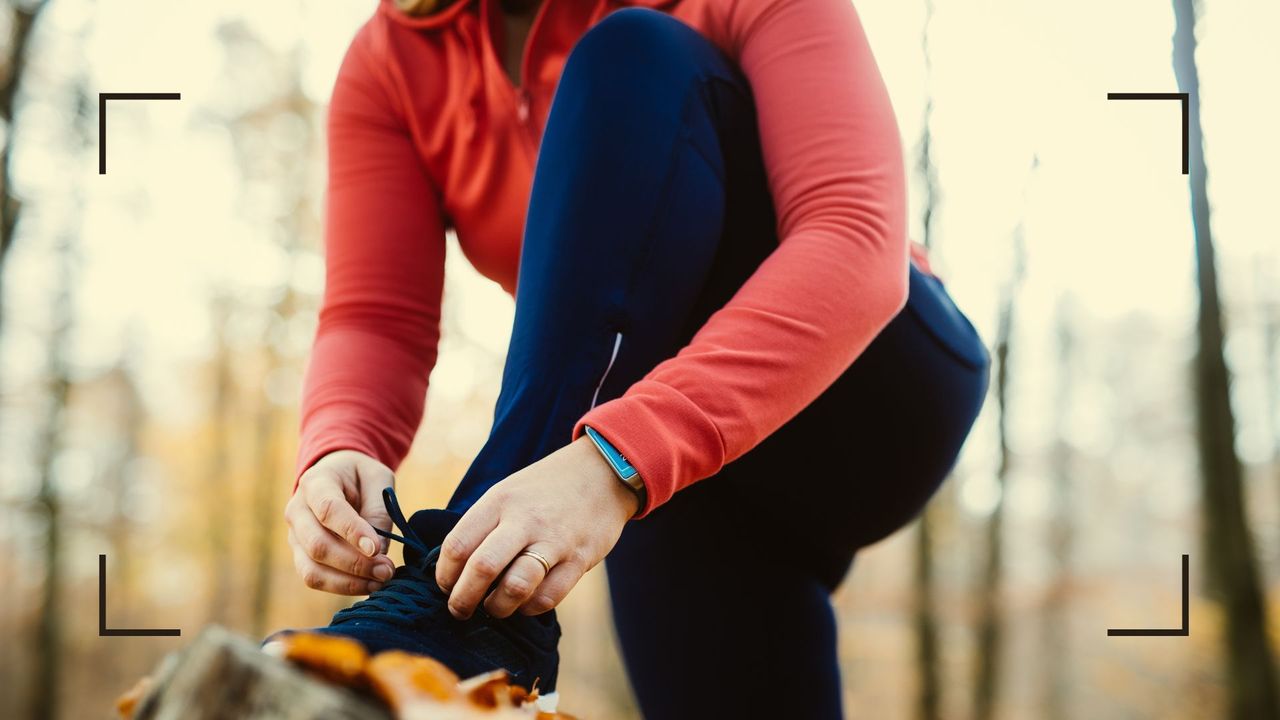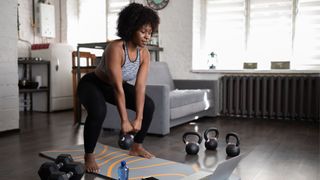Should I work out with a cold? Doctor reveals what you need to know about exercising this winter
Should I work out with a cold? Everyone asks this question in winter. Here, a doctor reveals all


Wondering if you should work out with a cold? As winter flu season hits, many of us are wondering the same thing. While many people stay at home with the sniffles, if you're basically feeling fine and keen to reach your health goals, it can be difficult to stray from your routine.
Naturally, you should only exercise when you're feeling healthy enough to do so. If your cold has left you feeling tired, lethargic, achy, and generally a little delicate, then it'll always be best to rest and recover. But what if you feel fine and you're just sneezing now and then?
It's a question that every fitness enthusiast is asking this time of year. Whether you're a fan of Nordic walking on the weekends or heading out early to the gym, having a cold or any type of flu can impact your workout. Here, a doctor specializing in sports and exercise medicine explains everything you need to know about whether it's okay to work out in winter and when you should delay your training.
Should I work out with a cold?
If you have a cold but feel well enough to exercise then it’s probably perfectly safe to do so, says Dr Folusha Oluwajana, an NHS-registered general practitioner and Level 3 personal trainer. “Exercise is fine for the average healthy person without any other significant health conditions, with mild cold symptoms. It might even make them feel better because they’re doing something they enjoy and it will lead to a release of those happy hormones, endorphins. Others might have to reduce the intensity of their exercise while they have a cold but can still do some.”
However, there are some circumstances where you should not exercise, even when you’re physically feeling fine. “If you have a fever when you have a cold, your body temperature is already raised,” the doctor explains. “If you further increase your environmental temperature by exercising, then you’re probably going to feel much more unwell and it could prolong the duration of your illness or slow down your recovery, so exercise is probably best avoided until you feel better.”
With the Covid pandemic still at the forefront of our minds this winter, it’s also worth considering others if you do decide to work out with a cold. This won’t be so much of an issue if you exercise outdoors with plenty of space between yourself and others but if you’re going to exercise in an enclosed space, like strength training at a gym or sports club, aim to keep a distance where possible and wipe down equipment after use.

What happens if you work out with a cold?
If you're still eager to head out and do some exercise, it's worth bearing in mind the impact that flu has on the body and the additional symptoms you might experience. As always, if you feel unwell in any way during exercise, stop immediately and seek medical help.
Sign up for the woman&home newsletter
Sign up to our free daily email for the latest royal and entertainment news, interesting opinion, expert advice on styling and beauty trends, and no-nonsense guides to the health and wellness questions you want answered.
1. You might be in pain
Cold or flu symptoms are a physical manifestation of your immune system's response to a virus attacking your body, so, unsurprisingly, adding additional pressure to the situation could cause you some pain.
"You might have a headache, be congested, have a sore throat, have generalized body aches and tiredness," Dr Oluwajana warns. "All of this will make it harder for you to push through any exercise, particularly if it's challenging and more strenuous. It will also be harder to focus and be motivated to do exercise."
2. You might find it harder to breathe
If you're deciding between running vs walking for your workout when you have a cold, going for a gentle walk will almost certainly be a better option where your breathing is concerned - even if you don't have any underlying health conditions.
"Our lungs and our airways are vital when it comes to exercise because they are how we get oxygen into the body so that it can be delivered to our muscles via our bloodstream," says Dr Oluwajana. "Oxygen is then used in the process of converting fuel into energy for our muscles to use during exercise. Lungs also help us get rid of waste products, such as carbon dioxide, that are generated from producing energy during exercise. We exchange oxygen for carbon dioxide which then we breathe out. So if our respiratory tract is compromised in any way, that will affect this process."
For example, she adds, "If you have a blocked nose, you're going to find it more difficult to get air in and out. If you have a very sore throat, it may be more painful to breathe, and if you have a chesty cough with a cold, that may affect your lower respiratory tract compromising oxygen exchange."
3. Working out with a cold could increase your recovery time
Exercising with a cold is a double-edged sword, just like exercising when you feel run down. While you may be happier if you go for a workout, whether that's a walk or something more strenuous, you could end up making your flu worse and having it for longer, which will undoubtedly impact your ability to train over the next few weeks.
"The impact of a cold is variable depending on the person and the severity of the cold. The individual themselves may have other medical problems which could change how a cold affects them that might make handling a cold more challenging. Some colds are worse than others. Some last a few days and have mild symptoms, whereas others can be more severe, leaving you in bed for days with a more prolonged recovery."

Can I sweat out a cold?
For those keen to kick their coughing and sneezing with a workout, Dr Oluwajana has some bad news: it’s not possible to sweat out a cold. “This is a common myth or old wives’ tale that isn’t actually true. Sweating is the body’s response to increased temperature. When your internal body temperature rises, your brain sends signals to your nervous system to stimulate sweat glands. Sweat glands then release sweat onto the skin and the evaporation of that sweat off the skin cools you down. This process has no impact on your immune system or your immune response to fighting the cold,” she explains. “It will not have any impact on the severity or the duration of your cold.”
Tips for adjusting your workout if you have a cold
- Make sure you're wearing the right clothes: Keeping your core body temperature warm when exercising is so important, even if you feel too hot, so consider how you're going to keep your feet warm if you're outside, and be sure to layer up.
- Swap HIIT for LISS: LISS cardio, otherwise known as low-intensity steady-state cardio, is cardiovascular exercise at a slower pace - like walking rather than running - and it has loads of health benefits.
- Drink lots of water: Studies from Ball State University demonstrate just how important water is for sports recovery and further research from the University of North Carolina shows it's integral for when our immune system is under pressure too. Exercise pushes water from our body in the form of sweat, so be sure to stay hydrated while you work out.
- Reduce the intensity and duration of your workout: If you decide you want to work out with a cold, scale down how hard you push yourself and the duration of your training session. For example, opt for a 30-minute strength training session with a light walk at the end, rather than a session where you're aiming to reach new goals.

Grace Walsh is woman&home's Health Channel Editor, working across the areas of fitness, nutrition, sleep, mental health, relationships, and sex. She is also a qualified fitness instructor. In 2025, she will be taking on her third marathon in Brighton, completing her first ultra marathon, and qualifying as a certified personal trainer and nutrition coach.
A digital journalist with over seven years experience as a writer and editor for UK publications, Grace has covered (almost) everything in the world of health and wellbeing with bylines in Cosmopolitan, Red, The i Paper, GoodtoKnow, and more.
-
 Caught ending explained: Who was the killer and is Leo dead?
Caught ending explained: Who was the killer and is Leo dead?Another Harlan Coben thriller is riding high on Netflix, and viewers are asking for a deep dive of the intense ending of Caught
By Lucy Wigley Published
-
 Chocolate brown is everywhere but Ranvir Singh's Reiss sale dress stands out from the crowd
Chocolate brown is everywhere but Ranvir Singh's Reiss sale dress stands out from the crowdRanvir Singh has made us fall in love with deep cocoa brown all over again and her Reiss midi dress is more than 50% off
By Emma Shacklock Published